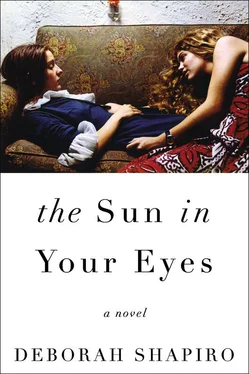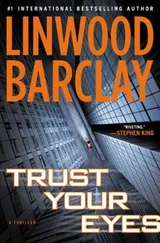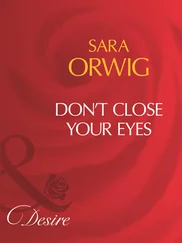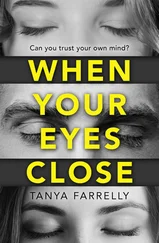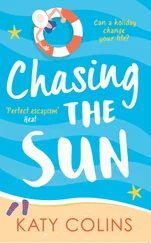“I know,” Lee continued. “It probably sounds very Harriet the Spy or something. But I’ve been thinking about my father a lot lately. Listening to all his old stuff. And I want more, to have more of his voice, to hear something I’ve never heard. I started tracking down some people, got in touch with Flintwick, and he said he would be happy to see me if I thought he could be useful. It may be a total fool’s errand, but I don’t really want to do it alone and you’re the only person who would understand. Andy, too — maybe Andy the most, in a way, but. .”
She couldn’t ask Andy. Because that would have been too weird, to ask that of your friend’s husband, especially when you had a history with him. She twisted the ring on her right hand, working it over her knuckle then slipping it back.
“How is Andy?” she asked.
“He’s good. He’s really good.”
“That’s good.”
It was right after Andy and I got married that Lee really pulled away. Weeks would pass before she would return my call and then she would somehow always reach me when I couldn’t pick up, leaving a short message. We had been drifting for a while. She had already left New York at that point, and I could guess at the reason for her distance, though she never explicitly told me. A long time ago, before either of them met me, Andy had been Lee’s more-than-a-friend friend, in that he had feelings for her. I turned the configuration into something of a triangle, and then I chose Andy over Lee. That was one version of the story. Another version, one that I never much liked to think about, is that the triangle wasn’t a stable one, that its sides shifted, and while it might seem like that’s where all the action was, the movement only distracted you from the base, the line connecting the two original points, Lee and Andy, a line that remained fixed and unbroken.
Andy and I had taken the subway together that morning and said goodbye on the corner of Forty-Seventh Street.
“How is it that you, we, always owe her something?” he asked. “What do we owe her for? At this point.”
I could think of many things, but I also didn’t see it as debt. I did my best to hide my hope that she wanted something, anything, from me.
“We’re just catching up,” I said. “Not that big a deal.” But if it was nothing, then why had he gotten off the train with me when it wasn’t his stop and he would only have to get back on? I looked at him on my way down the block. Was he standing there watching me walk away or waiting to catch a glimpse of Lee?
“So, Charlie Flintwick.”
“He still has his studio up in Ulster County.”
I mostly knew Flintwick, the long-time producer, as the deep-voiced issuer of grandiose and louche statements in documentaries about Lee’s father. “We’ll be forever touched by the influence of Jesse Parrish. Now, where we’ll be touched, and how, I will leave to your imagination. The question is, how pliant are you? Hmmmm?” He was disgusting and yet charming; it wasn’t quite a put-on, nor was it straight-faced.
Put it this way: I couldn’t actually imagine Charlie Flintwick having sex with anyone, I could only envision him sprawled on his side, naked and Rubenesque, suspending a bunch of grapes over his own head.
“He wasn’t gross,” Lee insisted. “Just open to meeting me. I think he sees me like a daughter.”
“That’s supposed to be reassuring?”
“Well, I’m going to talk to him and see where it goes. I have to at least try before it’s too late. He’s had two heart attacks already.”
She picked up the little pitcher again and this time added milk to her coffee, completing thoughts out of sequence.
“It’s funny — not funny — but it’s like I think I’m supposed to have moved beyond it. But if anything, at this point in my life, the older I get, the more strongly I feel it — that loss of my father. I still don’t even really know what it was I lost. What was going on with him in that time, before he died? What was he thinking? Feeling? It would be there, wouldn’t it, in the record he was making?”
If it were possible to have an ongoing conversation with a dam, it might have been a little like talking to Lee. She could be almost opaque and unbreachable in her circumspection and then she would let out a sluice of talk. She barely noticed when our meals arrived. Then she was on to her mother and Linda’s immunity to the past.
“Linda can dine out on the same old stories for years but it’s just dinner party talk. Interview patter. She’s not nostalgic for much of anything. She’s surprisingly forward-looking in a lot of ways. I was in this meeting the other day with her and a couple of our designers. And one of them had this mood board with a picture of Talitha Getty on it?”
I shook my head; the name didn’t register.
“Socialite — actress — drug addict in swinging sixties London. She also had a home in Marrakesh. She OD’d and died and then became a style icon for the aristo-boho set.”
“I see.”
“So Linda goes, ‘If I hear one more word about Talitha Getty and Moroccan fucking chic — Talitha fucking Getty! You know what you need to do? You need to Getty a new idea!’ If I told her what I wanted, where I was going — and I haven’t told her anything — I’m sure she’d tell me it’s time to Getty over it.”
I laughed, finally, and so did Lee.
“I’M NOT SAYINGthat she’s that callous. Though maybe I am. It’s just that almost everything I know about my father has come through Linda. Not that she’s been keeping something from me or denying me something, but these recordings would be something that hasn’t been filtered through her. Through anybody. One thing of his that was never public.”
She was nervous. It was new.
“So. What do you think? Will you come with me? To see Flintwick?”
It did seem kid-detective, Lee lighting out on a well-worn trail that had never led anywhere, as far as I knew. But she was also the femme fatale — the one who shows up with a story full of holes and you, the cynic and the sap, still follow her. And the old friend whose powers of persuasion still held sway because those powers had once persuaded you of so, so much. I thought of a time a couple of years out of college when we’d sat at these exact spots. I was coming from a grad school workshop where something I’d written was met with a resounding “eh.” Nobody in the class could pinpoint what was wrong with it, they simply didn’t find it all that compelling. And instead of getting angrily energized, developing a thicker skin, it was like I had no skin at all. On the subway afterward I stood looking at my reflection in the dark window of the doors as the train car tunneled along, thinking, There’s nothing really wrong with you, you’re just not all that compelling. I got off, walked to this restaurant, and there was Lee. Whatever we talked about wasn’t that important. But it was like listening to a radio, having been stuck on static and then finding a channel that came through strong and played songs you loved. It was always like that with Lee. Sometimes it seemed we were tuned to a phantom frequency, something only we could hear. I won’t belabor the metaphor. Lee said she would read the story and mark it up, double underlining everything she liked. She gave it back to me with pages full of railroad tracks.
My doubts were never much of a match for my tendency to say yes to her. If I thought that had changed, my difficulty in meeting her gaze now proved otherwise. She had this look— You have to. You have to or you’ll be missing out on a real adventure. I’m giving you this chance and all you have to do is take it .
“Work is super busy at the moment, you know? There’s a lot going on there. Jason and Justine — Jastine — are finally going to get married, only to honeymoon in a newly unstable island country. They’ve survived cancer, kidnapping, and Count Andre, but it remains to be seen if they can they survive a coup.”
Читать дальше
